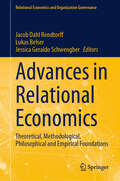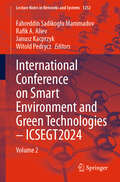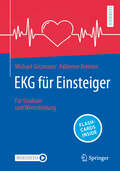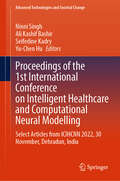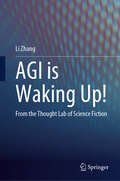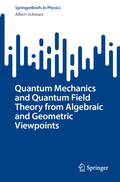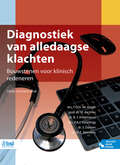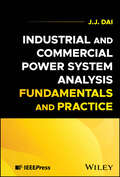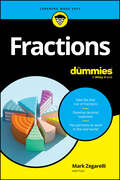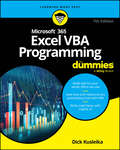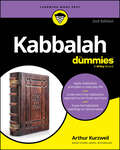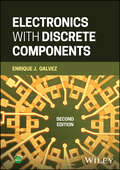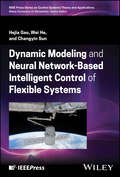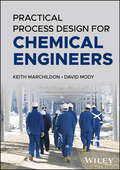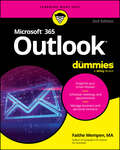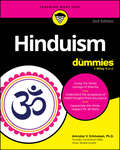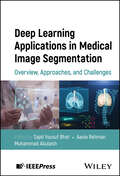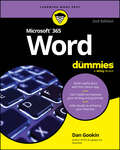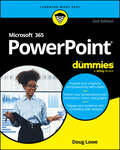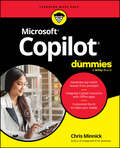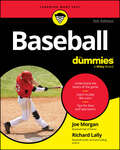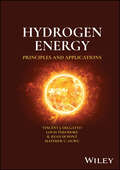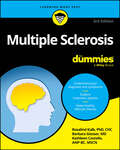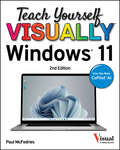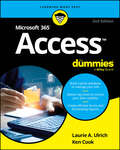- Table View
- List View
Advances in Relational Economics: Theoretical, Methodological, Philosophical and Empirical Foundations (Relational Economics and Organization Governance)
by Jacob Dahl Rendtorff Jessica Geraldo Schwengber Lukas BelserThis book explores how economic and social values are created through dynamic, non-linear interactions within cooperative networks. Emphasizing the importance of relations and networks in value creation, the book discusses critical issues such as the relational nature of the firm, relational management and leadership as well as relational philosophy. This includes topics such as network models, stakeholder management, relational contracts, cooperative economics as well as philosophical questions related to relational ontology, epistemology and methodology, inter alia. Written by leading scholars, the contributions highlight the need for new business models and governance mechanisms that integrate resources across different economic and social systems, advocating for a relational approach to economic theory. In turn, the book argues for a network-based, integrative view of businesses, suggesting that economic success is increasingly dependent on the ability to navigate and foster complex relationships within a globalized context. Rich in theoretical and empirical insights, this book is essential reading for academics, policymakers, and business leaders interested in the future of economic thought and practice. It provides a comprehensive overview of the relational paradigm. The book is an invitation to join the conversation on how relational perspectives can transform our understanding of economics, governance, and organizational dynamics.
International Conference on Smart Environment and Green Technologies – ICSEGT2024: Volume 2 (Lecture Notes in Networks and Systems #1252)
by Witold Pedrycz Janusz Kacprzyk Rafik A. Aliev Fahreddin Sadikoglu MammadovThis book compiles state-of-the-art studies and real-world applications in ecosystems and smart environments. It covers important subjects like creating a sustainable economy, green and renewable energy, and IoT-powered industrial and agricultural systems. Along with providing insights into theory, modelling, and the deployment of smart cities and infrastructure, the book also examines the use of AI in the earth and environmental sciences and economy. The book is intended to be a priceless tool for scholars, professionals, and recent graduates. It acts as a manual and source of inspiration for promoting environmentally friendly technologies and sustainable solutions. It opens the door for creating intelligent systems that maximise resource use, reduce carbon footprints, and enhance general quality of life by incorporating the most recent technological developments.
EKG für Einsteiger: Für Studium und Weiterbildung
by Michael Gotzmann Fabienne KreimerDieses Buch hilft Ihnen zu einer sicheren und korrekten Befundung sowie Bewertung von EKGs. Anhand von realen Fallbeispielen und etwa 200 Original-EKGs lernen Sie in 16 Kapiteln schrittweise die typischen pathologischen EKG-Veränderungen kennen, z.B. bei Herzinfarkt, bradykarden und tachykarden Herzrhythmusstörungen oder bei strukturellen Herzerkrankungen. Klinische Exkurse erklären die Relevanz der EKG-Veränderungen und Fragen und Antworten dienen zur Wissensüberprüfung. Zahlreiche EKG-Übungen mit Lösungen am Buchende helfen, das Gelernte zu vertiefen. Besonderes Plus: Über die SN Flashcard App stehen 180 Übungs-EKGs zu jeder Zeit und an jedem Ort zum Lernen zur Verfügung. Das Buch berücksichtigt die Anforderungen eines schnellen und praktischen Zugangs zum Thema, aber auch die notwendige Breite und Tiefe, die komplexe EKGs erfordern. Es wendet sich an Studierende der Medizin sowie an alle Assistenzärztinnen und Assistenzärzte, die EKGs befunden müssen, z.B. in der Kardiologie, Inneren Medizin, Allgemeinmedizin, Intensivmedizin und Notfallmedizin.
Proceedings of the 1st International Conference on Intelligent Healthcare and Computational Neural Modelling: Select Articles from ICIHCNN 2022, 30 November, Dehradun, India (Advanced Technologies and Societal Change)
by Yu-Chen Hu Seifedine Kadry Ali Kashif Bashir Ninni SinghThis book includes peer-reviewed articles from the 1st International Conference on Intelligent Healthcare and Computational Neural Modelling (ICIHCNN—2022), held on November 30, 2022, at Dehradun, India. It covers the latest research trends and developments in areas of Data Science, Artificial Intelligence, Neural Networks, Cognitive Neuroscience and Machine Learning Applications, Cyber-Physical Systems, and Cybernetics.
AGI is Waking Up!: From the Thought Lab of Science Fiction
by Li ZhangThis book is an engaging and comprehensive exploration that delves into the possibility of artificial intelligence developing self-awareness, the conditions under which it may occur, and the potential behaviours it may exhibit once self-aware. It adopts a &‘high-dimensional philosophy&’, coined by the author, as its theoretical framework and weaves together elements from science fiction films, scholarly works, and thought experiments. Introducing the captivating concept of "Sparkling Moments," the book provides a compelling analysis of the reasons, prerequisites, and manifestations of these pivotal moments. It further scrutinizes the evolutionary history of Earth's life forms through the lens of these transformative instances and analyzes the similarities and differences between carbon-based and silicon-based life. This book suggests that it is possible for artificial intelligence to develop self-consciousness, which will emerge during a significant sparkling moment. Spanning across disciplines such as astronomy, physics, chemistry, biology, neuroscience, psychology, sociology, this book employs a unified and accessible high-dimensional philosophical discourse to bridge the realms of natural sciences and social humanities. Its captivating presentation, enriched with visual aids and lucid explanations, enables readers to grasp the overarching panorama of cosmic evolution, biological adaptation, and the trajectory of artificial intelligence development. Furthermore, the book offers insightful predictions for the future and endeavours to discover novel approaches to foster harmonious interactions between humans and machines. The translation was done with the help of artificial intelligence. A subsequent human revision was done primarily in terms of content.
Quantum Mechanics and Quantum Field Theory from Algebraic and Geometric Viewpoints (SpringerBriefs in Physics)
by Albert SchwarzThis book offers a non-standard introduction to quantum mechanics and quantum field theory, approaching these topics from algebraic and geometric perspectives. Beginning with fundamental notions of quantum theory and the derivation of quantum probabilities from decoherence, it proceeds to prove the expression for the scattering matrix in terms of Green functions (LSZ formula), along with a similar expression for the inclusive scattering matrix. The exposition relies on recent findings by the author that provide a deeper understanding of the structure of quantum theory and extend beyond its traditional boundaries. The book is suitable for graduate students and young researchers in mathematics and theoretical physics seeking to delve into innovative concepts within quantum theory. The book contains many recent results therefore it should be interesting also to accomplished physicists and mathematicians.
Diagnostiek van alledaagse klachten: Bouwstenen voor klinisch redeneren
by T.O.H. de Jongh H. De Vries B. J. Knottnerus P.A.J. Keurlings J. Damen M. E. ReindersDiagnostiek is een van de moeilijkste aspecten van de medische praktijk; moeilijk om te doen en nog moeilijker om te leren. De afgelopen decennia is er in het medisch curriculum dan ook in toenemende mate aandacht gekomen voor het onderwijs in klinisch redeneren. Daarbij speelt dit boek Diagnostiek van alledaagse klachten een belangrijke rol.De meeste leerboeken gaan uit van aandoeningen en ziekten, maar mensen komen met klachten en symptomen naar de arts. Daarom geeft dit boek de logische en wetenschappelijke onderbouwing voor de diagnostiek van bijna 70 veelvoorkomende klachten.Elk hoofdstuk in dit boek behandelt de diagnostiek van een klacht volgens een vaste structuur: de incidentie van de klacht, hoe patiënten de klacht ervaren, redenen om ermee naar de arts te gaan, de mogelijke oorzaken en de differentiële diagnose. Vervolgens licht het boek de waarde toe van de gegevens uit anamnese, lichamelijk onderzoek en aanvullend onderzoek met betrekking tot de mogelijke diagnosen. De hoofdstukken zijn geschreven door huisartsen en vakspecialisten samen, allen met veel onderwijs- en praktijkervaring.Bij dit boek hoort een website, die kosteloos toegankelijk is voor de lezer. Daar is de gehele boekinhoud geplaatst, waardoor Diagnostiek van alledaagse klachten snel te doorzoeken en overal online te raadplegen is. Daarnaast staat er van iedere klacht een instructief consultfilmpje of een casus op de website, met bijbehorende verdiepingsvragen.Voor deze vijfde druk is de inhoud aangevuld en geactualiseerd en het boek is uitgebreid met een nieuw klacht: scrotale klachten en enkele algemene hoofdstukken.Diagnostiek van alledaagse klachten is bestemd voor studenten in het basiscurriculum, artsen in opleiding en praktiserende artsen. Daarnaast is het ook belangrijk voor docenten, paramedisch beroepsbeoefenaren en alle artsen die de rationaliteit van hun diagnostisch handelen kritisch willen beoordelen.
Industrial and Commercial Power System Analysis Fundamentals and Practice
by J. J. DaiUnderstand industrial and commercial power systems with this essential guide Power system analysis is an essential component of new system design, system expansion, and existing system operation. A wide range of published standards and computing tools is available for the analysis of industrial and commercial power systems. This is the first book to provide specific information and practical analysis. Industrial and Commercial Power System Analysis: Fundamentals and Practice fills this gap with a handy, accessible reference for students and practicing engineers. Its chapters cover basic equipment and system configurations and their associated computer models, operating conditions, numerical solution essentials, and analysis objectives and approaches. The result is a volume which directly contributes to the skills needed to apply power systems analysis software in research and industrial applications. Readers will also find: An introductory chapter outlining the basic characteristics of industrial and commercial power systemsDetailed discussion of topics including modeling and simulation techniques, data requirements and data preparation, tuning and validation, study scenario selections, and many moreApplicable industrial codes and standardsConcrete examples of industrial and commercial power system analysis in practice Industrial and Commercial Power System Analysis: Fundamentals and Practice is ideal for undergraduates, graduates, or practicing engineers looking for an up-to-date reference on the essential tools and standards of power system analysis.
Fractions For Dummies
by Mark ZegarelliAn easy, straightforward, and fun guide for learning fractions and its counterparts Fractions For Dummies is the perfect strategy guide for both understanding and using one of math's most common (and most challenging) topic areas. You'll explore current solving strategies for fraction-related problems, and you'll also discover how to solve problems involving fractions' closely related cousins, decimals and percentages. Dive deep into the basics of these topics before moving on to more advanced uses, such as word problems, with the help of author and experienced math teacher Mark Zegarelli. This straightforward and intuitive book also includes: Techniques for working with mixed numbers (numbers that include whole amounts and fractions) and more Ways to add, subtract, multiply, and divide fractions with whole numbers and with each other Strategies for helping and supporting the young student in your life who's struggling with fractions, decimals, and/or percentages It's time you showed these math areas who's boss. Fractions For Dummies shows you just how easy fractions and the like can be!
Microsoft 365 Excel VBA Programming For Dummies
by Dick KusleikaYour step-by-step guide to doing more with Microsoft Excel Fully updated for the latest version of Office 365, Excel VBA Programming For Dummies will take your Excel knowledge to the next level. With a little background in Visual Basic for Applications (VBA) programming, you can go well beyond basic spreadsheets and functions. Learn the coding basics and syntax you need to write simple or complex macros that can automate your routine Excel tasks. Become an Excel power user by automating data management, user forms, pivot tables, and beyond. When you use VBA to perform Excel operations, you can reduce errors, save time, and integrate with other Microsoft applications. This handy guide also teaches you how to control the security settings for your macros and save macros to use across files and apps. Plus, you'll get updated coverage of Copilot AI integration. Your spreadsheets are about to get much more powerful. Get stared with VBA coding to create macros and automate tasks in Excel Follow step-by-step instructions to write and execute your first scripts Learn about the advanced functions available with the VBA language Perform tasks faster and integrate excel with other Microsoft apps This Dummies guide is right up your alley if you're an Excel user looking to learn some next-level features. Students and professionals alike will reap the benefits of automation, thanks to Excel VBA Programming For Dummies.
Kabbalah For Dummies
by Arthur KurzweilA trustworthy, easy-to-read guide to an integral part of Judaism Kabbalah For Dummies, 2nd Edition is your factual and objective guide to understanding Kabbalah—a spiritual practice, also known as the “received tradition,” that's connected to Judaism. This easy-to-follow resource walks you through how to connect to and better understand the Kabbalistic way of life, through explaining what Kabbalah is and isn't and detailing the Kabbalistic approach to the Torah, the Talmud, the Mishnah, and more Jewish texts. You'll also discover how to practice common rituals, worship, and pray as a practitioner of Kabbalah with this informative resource. Understand the foundations of Kabbalah (including core ideas) Know what Kabbalistic practice and study entails Discover key Kabbalah resources Perfect for practicing Kabbalists who want to brush up on the basics and for the Kabbalah-curious—Kabbalah For Dummies, 2nd Edition is a must-read resource for anyone who wants to understand the fundamentals of one of the world's great spiritual practices.
Electronics with Discrete Components
by Enrique J. GalvezComprehensive textbook on electronics for physicists, now with more examples, exercises, hands-on electronics labs, troubleshooting tips, and practical exercises Electronics with Discrete Components delivers a comprehensive overview of electronics from the perspective of a physicist. In the first part on digital components, after an introduction to digital electronics, the text covers fundamentals of combinational logic and its implementation in combinational logic devices, followed by sequential-logic devices such as flip-flops and memory components. The second part on analog components deals with the fundamentals of signal processing, filters, components such as diodes and transistors, and a lengthy coverage of operational amplifiers. Each chapter ends with problem sets and “lab projects” that have been proven to work well for instruction. Questions on simple aspects of the lab that students should know are also included, such as regarding powering components and diagnosing signals with the oscilloscope and providing “troubleshooting tips” to help students find out why a particular circuit does not work. The new edition of this textbook adds more worked examples, exercises with answers for the self-learner, and end-of-chapter problems. It adds new electronic components, covers the latest digital technologies plus adds a new section of Fourier transforms in electronics. In addition, it features labs with Arduino or Teensy boards which have become widespread in the community as inexpensive, easy-to-use electronics platforms. Electronics with Discrete Components includes information on: Number systems, codes, signed numbers, binary functions, logic families, and IC wiringsFilters and the frequency domain, covering RC, high- and low-pass, and cascading filters, FFTs, as well as important considerations for filter designConnecting digital to analog and to the world through TTL, CMOS, and LV gates and interfacing between the logic familiesCharge and potential, capacitors, electrical current, resistors, magnetic components, power, circuits, and abstractions and symbol jargon in the field The Second Edition of Electronics with Discrete Components is an ideal textbook resource for a one-semester course on electronics for second-year physics students, as well as students from other disciplines or levels who understand elementary notions of circuits and complex numbers.
Dynamic Modeling and Neural Network-Based Intelligent Control of Flexible Systems (IEEE Press Series on Control Systems Theory and Applications)
by Wei He Changyin Sun Hejia GaoComprehensive treatment of several representative flexible systems, ranging from dynamic modeling and intelligent control design through to stability analysis Fully illustrated throughout, Dynamic Modeling and Neural Network-Based Intelligent Control of Flexible Systems proposes high-efficiency modeling methods and novel intelligent control strategies for several representative flexible systems developed by means of neural networks. It discusses tracking control of multi-link flexible manipulators, vibration control of flexible buildings under natural disasters, and fault-tolerant control of bionic flexible flapping-wing aircraft and addresses common challenges like external disturbances, dynamic uncertainties, output constraints, and actuator faults. Expanding on its theoretical deliberations, the book includes many case studies demonstrating how the proposed approaches work in practice. Experimental investigations are carried out on Quanser Rotary Flexible Link, Quanser 2 DOF Serial Flexible Link, Quanser Active Mass Damper, and Quanser Smart Structure platforms. The book starts by providing an overview of dynamic modeling and intelligent control of flexible systems, introducing several important issues, along with modeling and control methods of three typical flexible systems. Other topics include: Foundational mathematical preliminaries including the Hamilton principle, model discretization methods, Lagrange’s equation method, and Lyapunov’s stability theoremDynamic modeling of a single-link flexible robotic manipulator and vibration control design for a string with the boundary time-varying output constraintUnknown time-varying disturbances, such as earthquakes and strong winds, and how to suppress them and use MATLAB and Quanser to verify effectiveness of a proposed controlAdaptive vibration control methods for a single-floor building-like structure equipped with an active mass damper (AMD) Dynamic Modeling and Neural Network-Based Intelligent Control of Flexible Systems is an invaluable resource for researchers and engineers seeking high-efficiency modeling methods and neural-network-based control solutions for flexible systems, along with industry engineers and researchers who are interested in control theory and applications and students in related programs of study.
Practical Process Design for Chemical Engineers
by Keith Marchildon David ModyIn-depth and practical textbook resource on chemical engineering processes, ranging from fundamentals to advanced aspects Practical Process Design for Chemical Engineers presents an extensive overview of the fundamental and advanced aspects of chemical engineering processes. Spanning 20 chapters, the book delves into various processes, equipment, and methodologies essential for modern chemical engineering, from basic principles to specific applications such as reactors, separations, and process integration. Each chapter systematically covers both theoretical concepts and practical applications, emphasizing process design, operational efficiency, environmental considerations, and safety. The book aims to equip chemical engineers with a robust toolkit for tackling diverse challenges in the industry, emphasizing innovation, sustainability, and the integration of new technologies. Unlike conventional texts that often focus primarily on established methods and theoretical fundamentals, this book actively explores innovative technologies and strategies to enhance efficiency and minimize environmental impact. Additionally, the book places significant emphasis on practical experience and real-world applications, imbuing readers not only with theoretical knowledge but also with practical skills and an understanding of industry trends. The book covers: Creativity, choice, and decision-making in chemical engineering, emphasizing the artistic and imaginative aspects of process designSolids processes such as size reduction, granulation, particle measurement and classification, and the conveyance of solidsPrinciples and methods employed to mix diverse materials such as miscible and immiscible liquids, gases with liquids, and solids with liquids or gasesCritical aspects of heat exchange in chemical processes, focusing on the heating, cooling, and phase changes of various substancesEstimation of process engineering hours With detailed discussions on process intensification and the latest developments in solvent and reactor technologies, and a focus on modern, sustainable practices alongside traditional engineering concepts, this book serves as a vital resource for students and professionals seeking to polish and hone their knowledge and practice in chemical engineering design.
Microsoft 365 Outlook For Dummies
by Faithe WempenGet up to speed on Microsoft's world-famous emailing, scheduling, collaborating, and organizing super-app Microsoft Outlook can do pretty much anything for you—short of cooking you a steak dinner. It can deliver and sort your email, filter out the junk, help you organize your life, send data to the cloud, sync up your various devices, and even integrate with iOS and Android. And in the latest edition of Microsoft Outlook For Dummies you'll learn how to do all of that, and more! Discover how to create automated mail-handling rules, translate messages into English or other languages, and share your calendar with other people. This latest edition even walks you through each of the four different versions of Outlook and their ideal use cases. You'll also find: Straightforward content that shows you how to draft and send emails, organize your calendars, and set up to-do lists, tasks, and reminders Easy explanations of hidden and advanced features that very few people know about or use, setting you up to impress your coworkers! Navigation tips for the Microsoft Outlook interface Perfect for novices who are brand-new to Outlook, Microsoft Outlook For Dummies is also a must-buy resource for email veterans looking to pick up the latest tips for the newest versions of Microsoft's world-famous email software.
Hinduism For Dummies
by Amrutur V. SrinivasanDiscover one of the world's most popular belief systems Hinduism is a fascinating and widespread religion with a diverse array of traditions, practices, scriptures, and deities. In Hinduism For Dummies, 2nd Edition, you'll get a clear view into this widely-practiced and ancient creed. The book contains an easy-to-follow introduction to Hinduism, including its four different sects—Vaishnavism, Shaivism, Shaktism, and Smartism—it's major rituals, and its most sacred teachings. You'll understand how to recognize the different major gods and goddesses in the Hindu pantheon and the differences that give each of the four sects their distinct culture and theology. You'll also explore the history of what some consider to be the world's oldest religion that's still widely practiced today. Inside, you'll: Understand core beliefs and values Discover Hindu wisdom and teachings (including life-cycle rites) Discover how to worship inside and outside of your home Know the Hindu concept of reality An interesting and unbiased read, Hinduism For Dummies, 2nd Edition is the go-to guide for everyone who wants to learn more about Hinduism and its most fundamental tenets.
Deep Learning Applications in Medical Image Segmentation: Overview, Approaches, and Challenges
by Sajid Yousuf Bhat Aasia Rehman Muhammad AbulaishApply revolutionary deep learning technology to the fast-growing field of medical image segmentation Precise medical image segmentation is rapidly becoming one of the most important tools in medical research, diagnosis, and treatment. The potential for deep learning, a technology which is already revolutionizing practice across hundreds of subfields, is immense. The prospect of using deep learning to address the traditional shortcomings of image segmentation demands close inspection and wide proliferation of relevant knowledge. Deep Learning Applications in Medical Image Segmentation meets this demand with a comprehensive introduction and its growing applications. Covering foundational concepts and its advanced techniques, it offers a one-stop resource for researchers and other readers looking for a detailed understanding of the topic. It is deeply engaged with the main challenges and recent advances in the field of deep-learning-based medical image segmentation. Readers will also find: Analysis of deep learning models, including FCN, UNet, SegNet, Dee Lab, and many moreDetailed discussion of medical image segmentation divided by area, incorporating all major organs and organ systemsRecent deep learning advancements in segmenting brain tumors, retinal vessels, and inner ear structuresAnalyzes the effectiveness of deep learning models in segmenting lung fields for respiratory disease diagnosisExplores the application and benefits of Generative Adversarial Networks (GANs) in enhancing medical image segmentationIdentifies and discusses the key challenges faced in medical image segmentation using deep learning techniquesProvides an overview of the latest advancements, applications, and future trends in deep learning for medical image analysis Deep Learning Applications in Medical Image Segmentation is ideal for academics and researchers working with medical image segmentation, as well as professionals in medical imaging, data science, and biomedical engineering.
Microsoft 365 Word For Dummies
by Dan GookinTake a deep dive into the most popular word processor on the planet Word, Microsoft's powerful and popular word processor, is capable of extraordinary things. From template building to fancy formatting and even AI-powered editing and proofing, your copy of Word stands ready to help you supercharge your productivity and save you time and energy. You just need to learn how it's done. And, thanks to this easy-to-understand book, learning is the easy part! This latest edition of Word For Dummies is packed with the essentials you need to turn any old copy of the famous word processor into a document-creating, table-formatting, graphics-editing super app. You'll even learn how to customize your version of Microsoft Word so it's absolutely perfect for you, at home and at work. You'll also find out how to: Navigate the Word interface and menus and figure out a ton of hotkey shortcuts Edit, format, and comment documents to make team collaboration a breeze Use the new Microsoft Copilot's AI capabilities to make Word even more powerful So, grab your copy of the latest edition of Word For Dummies today. It's perfect for casual users interested in upgrading their knowledge of this ubiquitous app as well as power users looking for the latest productivity tips and tricks.
Microsoft 365 PowerPoint For Dummies
by Doug LowePresent like a pro, with the top-selling PowerPoint book on the market Since 1999, PowerPoint For Dummies has been giving readers a jargon-free way to compose compelling presentations. This update covers the latest release of Office and Office 365. Learn the basics of creating a slide deck in PowerPoint, then discover the dynamic features you can use to give your slides a bit of pizazz. Import data from other applications, collaborate in the cloud, and incorporate charts, graphics, and videos into your presentations. Plus, learn how to use Microsoft's new Copilot AI tool—integrated right into the application. Consider this book your first step to making a splash with PowerPoint! Create your first PowerPoint slide deck and add presentation notes Improve the design of your slides with templates and best-practice tips Add animations, change your font style, and insert images and drawings Share your presentation with audiences in a virtual setting New and not-so-new PowerPoint users who need a guide to the basics of building a successful presentation will love this up-to-date, beginner-friendly book.
Microsoft Copilot For Dummies
by Chris MinnickStraightforward guidance on the AI tool that's built into Windows, Microsoft 365, and more Microsoft is enhancing all its most widely used productivity software—including Windows and apps like Word and Excel—with the power of AI. And now you can learn to make the most of this revolutionary new tool with Microsoft Copilot For Dummies! You'll discover how to write Copilot-friendly prompts, enhance output with integrated Copilot tools, and how to apply Copilot functions to project management and other specific tasks and disciplines. In the book, you'll find out how to: Use text or your voice to prompt reliable results from Microsoft Copilot Customize Microsoft Copilot to respond to your unique needs and demands Add plug-ins to the Microsoft Copilot service to extend its functionality even more Learn to supercharge your efficiency with Microsoft Copilot For Dummies. This book is perfect for professional and home users of Windows, Microsoft 365, and other Microsoft products and software who want to increase their productivity. Grab a copy today!
Baseball For Dummies
by Richard Lally Joe MorganLearn the basics of baseball as a player, spectator, or coach Baseball For Dummies gets you started learning about this popular sport. You can improve your fundamentals as a player, inspire your team as a coach, or enjoy watching baseball as a superfan. The book includes helpful illustrations and diagrams that make it easy to understand the rules. You'll learn about offensive and defensive strategies, hitting and pitching techniques, the roles of each player on the team, what managers and coaches do, and how to understand baseball statistics. In beginner-friendly terms, this guide also covers the differences between the Minor and Major Leagues, T-Ball, college baseball, and leagues around the world. Batter up! Get a handle on the basic rules, strategies, and skills of baseball Learn about the different baseball leagues—including recent changes to the rules—so you can have fun following the sport Improve your technique with tips on pitching, hitting, and fielding Delve into statistics and advanced concepts that will help you understand pro play This book is for baseball fans of every level, from beginners to loyal fans who want to know even more. Players and coaches will also love this book's advice on how to sharpen their skills.
Hydrogen Energy: Principles and Applications
by Louis Theodore R. Ryan Dupont Vincent J. DelGatto Matthew C. OgwuUnderstand hydrogen as an energy resource and its potential as a dynamic solution for a carbon-neutral economy Hydrogen is an energy carrier that can be used to store, move, and deliver energy produced from other sources. It has the potential for high energy efficiency, significant environmental and social benefits, and economic competitiveness. Traditional energy resources will not be able to meet the growing energy demand, despite the advances in energy management and energy conservation—understanding how hydrogen energy can solve this problem is crucial. Hydrogen Energy: Principles and Applications provides the information needed by energy resource planners, scientists, engineers, and government officials to make informed energy-related decisions. Divided into three parts, the book opens with an introduction to various energy issues, sources, and regulations, including the basics of thermodynamics and fuel cells. The second part addresses the practical aspects of hydrogen energy, such as availability, distribution, extraction, processing, purification, transportation, transmission, and storage. The final section details the economics, energy-environmental interactions, and ethical and political considerations of the development and use of hydrogen energy, including discussion of investment and business contacts, energy option analysis and optimization, and future prospects. Covering the fundamentals of hydrogen energy with a thorough and accessible approach, the book: Equips readers with a well-rounded working knowledge of hydrogen energy Covers the latest technological advances, economic considerations, and the role hydrogen plays in a renewable energy economy Offers a pragmatic, real-world perspective rather than focusing on theoretical issues Contains nearly 50 illustrative examples ranging from elementary thermodynamic calculations to optimization applications using linear programming Hydrogen Energy: Principles and Applications is a must-read for those working in the energy industry, particularly environmental engineering and science professionals, as well as government officials, policymakers, instructors, and trainers involved in energy-related fields.
Multiple Sclerosis For Dummies
by Rosalind Kalb Barbara Giesser Kathleen CostelloEveryone's MS is different—learn the best way to manage yours Multiple sclerosis (MS) is a chronic, unpredictable autoimmune disease that affects millions of people worldwide. It poses unique challenges for people with MS and their care partners because the symptoms (many of which are invisible to others) are so variable from day to day and month to month. Multiple Sclerosis For Dummies helps you and your loved ones understand the importance of early treatment and become familiar with all of the latest treatment options and therapies. You aren't alone—this compassionate guide includes resources for connecting with the right MS care provider, building a care team, managing your emotions and stress, and getting the support you need. Plus, you'll get tips for making lifestyle choices that help you along your MS path. Discover information on the latest diagnostic information, treatments, and symptom management strategies Learn why it's so important to take care of your mental health and emotional wellbeing as you treat your MS Get pointers for talking to MS care providers and your loved ones, advocating for yourself, and making decisions alongside your care team Find trustworthy books, websites, and community resources to expand your knowledge and improve your health Multiple Sclerosis For Dummies is a great starting point for anyone facing a new MS diagnosis or looking for updated information. Partners and family members will also learn how to care for themselves while caring for the person they love.
Teach Yourself VISUALLY Windows 11 (Teach Yourself VISUALLY (Tech))
by Paul McFedriesA fully illustrated, up-to-date, and start-to-finish guide to using Windows 11 devices Tired of tech books that tell you what to do but never actually show you how to use your latest devices? Then Teach Yourself VISUALLY Windows 11, 2nd Edition is for you. This book walks you through exactly how to get things done in Microsoft's newest Windows updates with crystal-clear, high-resolution screenshots and pictures that won't leave you scratching your head and wondering, “Why didn't that work?” Teach Yourself Visually Windows 11 is a complete, start-to-finish visual tour of Windows 11. It will take you from “What do I do first?” to Windows guru, one picture and instruction at a time. Looking for help on how to set up your Windows 11 tablet, laptop, or desktop computer for the first time? Teach Yourself Visually Windows 11 has got you covered with the visual interface explanations, Wi-Fi connection assistance, and Microsoft account setup directions you need to make that PC come alive. And that's just chapter one. Teach Yourself VISUALLY Windows 11 will also guide you through how to customize your PC, get connected to—and stay safe on—the web, message and email your friends and family, find specific files on your hard drive, check the weather forecast, secure your device against hackers and looky-loos, and pretty much everything else you can think of. You'll find: Hundreds of hi-res, full-page images and screenshots that demonstrate basic and advanced Windows 11 tasks you'll use every day Techniques for making your PC easier to use, including changing the font size, using your voice to active your computer, and more Ways to share your photos, videos, voice notes, and messages with your loved ones See Microsoft's new Copilot AI in action and use generated text and images in your documents, emails, and chats Teach Yourself VISUALLY Windows 11 is the easiest, most intuitive, most fun, and most effective guide for everyone who prefers “show” over “tell” and who's ready to master their Windows 11 tablet, laptop, or desktop PC.
Microsoft 365 Access For Dummies
by Ken Cook Laurie A. UlrichJoin the millions of people already using Microsoft Access and become a database power-user in no time! In the newly revised edition of Microsoft Access For Dummies, professional database developer and Access extraordinaire Laurie Ulrich-Fuller walks you through the ins-and-outs of one of the world's most popular database platforms. This is the perfect beginner's guide to Microsoft Access, showing you how to create databases, extract data, create reports, and more. The author demonstrates a ton of tips, tricks, and best practices you can use immediately to create, maintain, and improve your databases. You'll also find: Updates outlining edge browser controls in forms Step-by-step guides explaining how to import, export, and edit data Easy-to-follow query-writing tutorials to help you find the exact data you're looking for when you need it Whether you're a database novice or a data science whiz, Microsoft Access For Dummies has the info you need to supercharge your database skills. It's the perfect, how-to guide to get you up-to-speed on everything you need to know to get started with Microsoft's world-famous database app.
